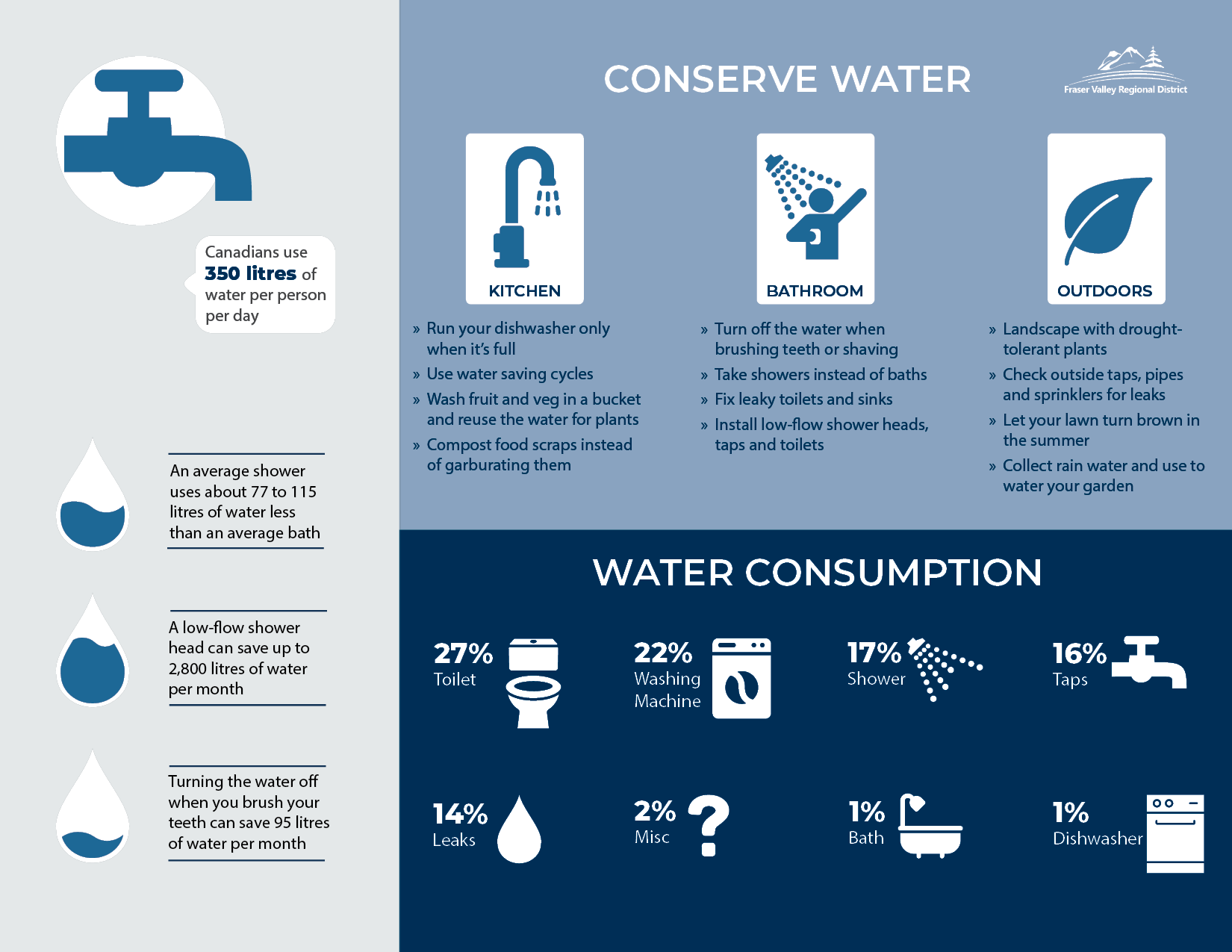Water Conservation
We operate several water systems for our Electoral Area communities throughout the region. To find out if you are on an FVRD water system visit our water service area map.
The following water conservation measures are currently encouraged within the FVRD Electoral Areas:
- hand watering of flower gardens, vegetable gardens, decorative planters, shrubs or trees. Drip irrigation or micro sprinkler irrigation for watering flower gardens, vegetable gardens, decorative planters and shrubs or trees. Watering as early in the morning as possible will reduce water demands and increase water absorption.
- prevention or control of fires
- for the health or safety of any person
The following water conservation measures are currently not encouraged within the FVRD Electoral Areas:
- use a watering system to water a lawn, garden, or landscaped areas
- fill a swimming pool, hot tub, tank, vessel, garden pond, decorative fountain
- wash sidewalks, driveways, walls, roofs, or other outdoor surfaces
- hand watering of lawns or grass
Report A Violation or Concern
If you are on an FVRD water system and have questions, or concerns, or would like to report a water use violation, please contact the FVRD engineering department at engineeringinfo@fvrd.ca or call 604-702-5044
If you are not on an FVRD water system and would like to report a water use violation, please use this link to report directly to the Province of BC: https://forms.gov.bc.ca/industry/report-a-natural-resource-violation/
Save Water Indoors
Stop those leaks!
Check your indoor water-using appliances and devices for leaks. Many silent leaks allow water, and your money, to go down the drain. Studies have shown that homes can waste more than 10 percent of their water due to leaking, which costs both you and the environment.
Replace Your Old Toilet
If your home is more than five to ten years old and the toilet, which is the largest water user in your home, has never been replaced, then it is very likely you do not have a water-efficient, 6-litre (1.6-gallon) per flush toilet. Even some newer homes still have high-flush toilets. The volume per flush is often printed at the back of the seat, near the base of the tank or the seat hinge.
Replace Your Clothes Washer
Your washer is the second-largest water user in your home. Energy Star™ rated washers with a water factor at or lower than 9.5, use 35 to 50 percent less water and 50 percent less energy per load. This saves you money on both your water and energy bills.
Save Water Outdoors
Plant the Right Plants
Whether you are putting in a new landscape or slowly changing the current landscaping at your home, select plants that are appropriate for your local climate conditions. A yard with a 100 percent lawn turf area in a dry climate uses significant amounts of water. Also, consider the trend towards xeriscaping and natural landscaping.
Water Wisely
Most water is wasted in your garden by watering your plants when they do not need water or by not maintaining the irrigation system. If you are manually watering, set your oven timer or some other reminder to move the water promptly. Make sure your irrigation controller has a rain shutoff device and that it's appropriately scheduled. Most water is wasted in months prior to or just after the rainy season when intermittent rains occur.Check Irrigation and Sprinklers for Leaks
Another large water waster can be leaks in your irrigation system. Fix irrigation system leaks quickly and check for water in the gutters or mud puddles. Inspect your sprinklers and drip sprayers regularly for leaks during the daytime since the optimal time to water is in the nighttime hours when you cannot observe leaks. If you have an older irrigation system, over 50 percent (and sometimes more than 75 percent) of the water it uses can be lost to leaks.


